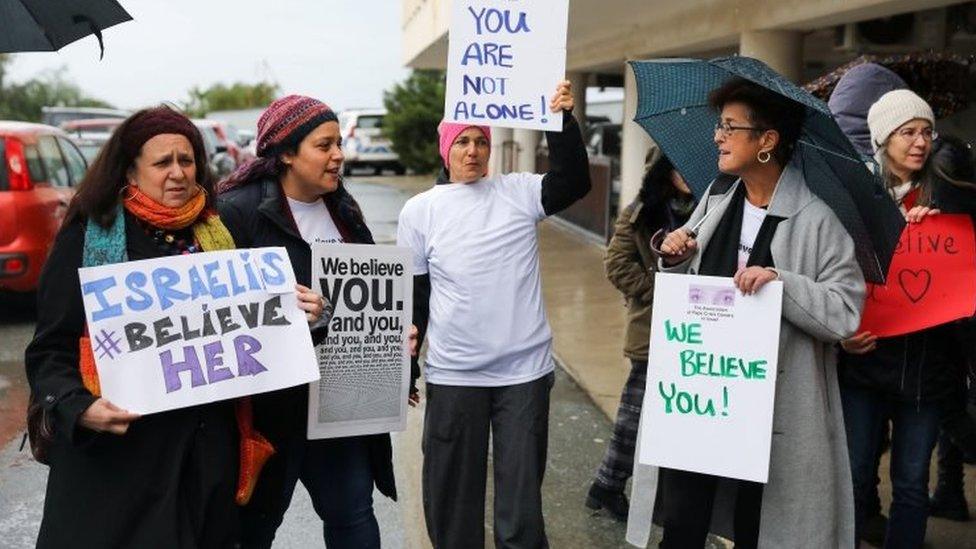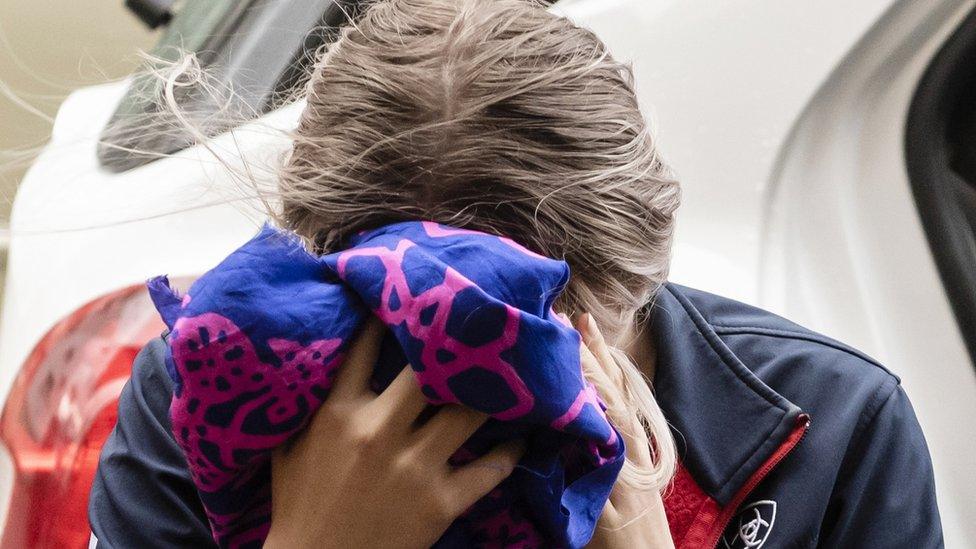Ayia Napa Briton returns home after false rape claim sentence in Cyprus
- Published
Protesters say they believe the British woman's rape claim
A British woman found guilty of lying about being raped by a group of young Israelis in Cyprus has landed back in the UK.
The 19-year-old was given a four-month sentence, suspended for three years, and ordered to pay €148 (£125) in legal fees by a court in Paralimni earlier.
She arrived at Heathrow airport with her mother but avoided waiting media.
Her lawyer said she is planning to appeal against her conviction and the case was "not finished by any means".
The teenager was put on trial and convicted in December after recanting a claim that she had been raped by a group of 12 young men in a hotel room in July.
She said Cypriot police had made her falsely confess to lying about the incident - something police have denied.
Following the sentencing, her lawyer, Lewis Power QC, said: "We will be seeking an expedited appeal to the Supreme Court of Cyprus and we will also be considering going to the European Court of Human Rights.
"We do not feel we have had justice in terms of how the trial progressed, the manner in which it was conducted, the initial police investigation and the fact that we feel she did not receive a fair trial."
In an interview with the Sun newspaper, external before arriving home, the teenager said: "I really thought it would be a custodial sentence when I arrived at court. When the translator said four months, I thought I was going to jail.
"It was only when she said suspended that I realised I was actually finally going home. I looked at my mum and we both had tears in our eyes.
"It's been a nightmare for me, mum and everyone," she said. "What kept me going was my family and the amazing support of my friends and all other people who got in contact to say they believed me."
"We're pleased she's going home," lawyer Lewis Power QC says
In court on Tuesday, Judge Michalis Papathanasiou told the teenager he was giving her a "second chance" by suspending her sentence - allowing her to fly back to the UK.
He said the woman's "psychological state, her youth, that she has been away from her family, her friends and academic studies this year" had led him to the decision.
BBC world affairs correspondent Caroline Hawley said the case "has had diplomatic ramifications" for Cyprus and the UK's relationship.
Following the sentencing, Boris Johnson's spokesman said the UK prime minister was "pleased" she could now return home.
However, Downing Street said the UK government had highlighted its "concerns about the judicial process in this case and the woman's right to a fair trial" to the Cypriot authorities.

Analysis
By BBC world affairs correspondent Caroline Hawley
This is a case that has had diplomatic ramifications.
There's been disquiet over the teenager's treatment by police and her trial and last week the Foreign Office took the unusual step of calling the case "deeply distressing".
Foreign Secretary Dominic Raab spoke to his Cypriot counterpart last Friday and the UK government says it will now be working with Cyprus to make sure a case like this can never happen again.
Cyprus, a former UK colony, attracts huge numbers of British holidaymakers every year and there have been calls for a boycott.
But it's also a country that has been forging closer relations with Israel of late. It recently signed a gas deal for a pipeline and that has led some to question whether this could have had any bearing on the handling of the whole case.
Campaigners also point out that a rape claim would potentially be a PR disaster for the holiday island.

The Briton's conviction has also been met with a backlash from women's rights groups in Cyprus, Israel and the UK.
Supporters from Cyprus and a group of 50 women who travelled from Israel gathered outside the Famagusta District Court on Tuesday holding placards.
Orit Sulitzeanu, head of the Association of Rape Crisis Centers in Israel, told BBC News the conviction was "unbelievable".
"She is not to blame at all," Ms Sulitzeanu said. "This sentence reflects backward thinking and not understanding the dynamics of rape. The judge here must learn what happens to the victim of sexual abuse."

Orit Sulitzeanu (right) with supporters from Israel
Susana Pavlou, director at the Mediterranean Institute of Gender Studies in Cyprus, said the case had sparked a "culture of protest" in the country.
"This year it has been revealed how broken our criminal justice system is - broadly in terms of police and social services response to violence against women, and the lack of specialist services.
"It's heartening to see how this has ignited women's rights campaigners and a women's rights movement focusing on this issue.
"This is not going to go away, we will not be silenced."
The teenager told police she was raped on 17 July at the Pambos Napa Rocks Hotel.
Twelve men were arrested but later freed and returned home after she retracted her claims.
She was charged and spent about a month in prison before being granted bail in August ahead of her trial, at which she pleaded not guilty to causing public mischief by falsely accusing the group of raping her.
- Published1 January 2020

- Published30 December 2019
